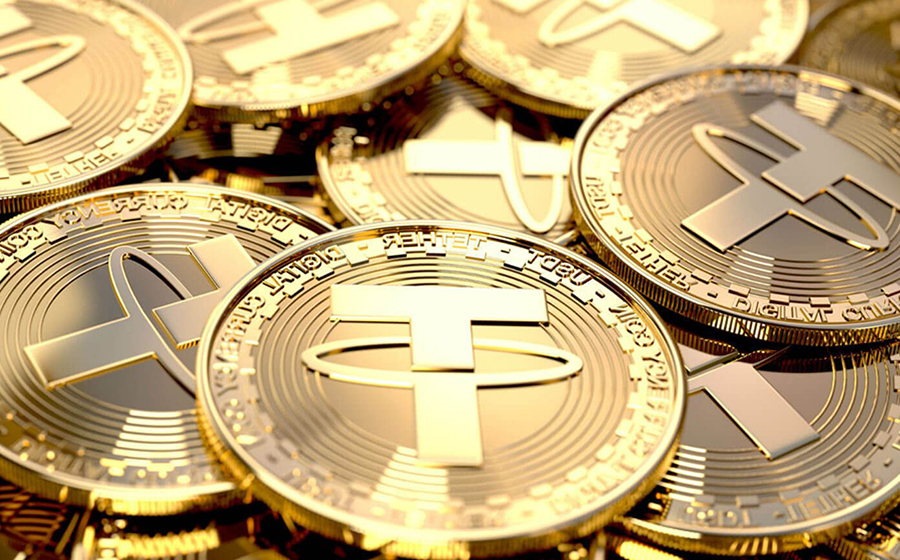Tether Aims for $10 Billion Profit and AI Expansion in 2024
21.12.2024 19:00 2 min. read Alexander Zdravkov
Tether, led by CEO Paolo Ardoino, has set its sights on an ambitious goal of generating $10 billion in profits in 2024, driven by the surging demand for its USDT stablecoin.
With its market cap soaring over 50% this year to reach $140 billion, Tether is also venturing into artificial intelligence, a bold move that could reshape its role in the digital economy.
This year, Tether has significantly reinvested its profits to sustain growth, including a recent $775 million commitment to the video-sharing platform Rumble. This investment, which included $250 million in cash and a stock tender offer, boosted Rumble’s shares by 50% in after-hours trading.
Ardoino has confirmed that Tether plans to allocate a similar portion of next year’s profits to new opportunities, with AI as a central focus. The company aims to launch its AI platform in early 2025, allowing users to seamlessly interact with cutting-edge technology through mobile applications.
As the global regulatory environment evolves, Tether is eyeing expansion in the United States, buoyed by expectations of crypto-friendly policies under the incoming Trump administration. Howard Lutnick, Trump’s nominee for Commerce Secretary and CEO of Cantor Fitzgerald—a firm involved in managing Tether’s reserves—could play a key role in shaping this trajectory.
Meanwhile, Europe presents challenges as exchanges begin delisting USDT ahead of the MiCA regulations. However, Tether sees an opportunity to strengthen its foothold in the Americas, where crypto adoption continues to grow, positioning the company to capitalize on emerging trends and maintain its leadership in the stablecoin market.
-
1
Big Funds Sell $51B in May, But Buybacks Cushion U.S. Stock Market
20.06.2025 10:00 2 min. read -
2
Canton Network Developer Secures $135M to Expand Institutional Blockchain Use
25.06.2025 12:00 1 min. read -
3
AI Revolution Could Send Nasdaq Soaring, Says Market Expert
19.06.2025 14:00 1 min. read -
4
Reddit Might Embrace Worldcoin’s Iris Scan to Verify Users Without Doxxing
21.06.2025 14:00 2 min. read -
5
Top Spanish Bank Urges Wealthy Clients to Allocate Up to 7% in Crypto
18.06.2025 17:00 2 min. read
Binance CEO Issues Urgent Crypto Security Reminder
As cryptocurrency adoption accelerates worldwide, so too does the frequency and sophistication of online threats. Richard Teng, CEO of Binance, has sounded a clear warning: the safety of digital assets hinges not just on exchange security but also on individual user responsibility.
Ripple Selects BNY Mellon as Custodian for RLUSD Stablecoin Reserves
Ripple has chosen global banking giant BNY Mellon to act as the primary custodian for reserves backing its enterprise-grade stablecoin, Ripple USD (RLUSD).
Here is Why the Fed May Cut Rates Earlier Than Expected, According to Goldman Sachs
Goldman Sachs now expects the Federal Reserve to begin cutting interest rates sooner than previously anticipated, forecasting the first reduction as early as September 2025.
Robinhood Faces Scrutiny from European Bank Over Tokenized Stock Offerings
Lithuania’s central bank has reached out to Robinhood for further details regarding its newly launched stock token products, following a public distancing by OpenAI from the initiative.
-
1
Big Funds Sell $51B in May, But Buybacks Cushion U.S. Stock Market
20.06.2025 10:00 2 min. read -
2
Canton Network Developer Secures $135M to Expand Institutional Blockchain Use
25.06.2025 12:00 1 min. read -
3
AI Revolution Could Send Nasdaq Soaring, Says Market Expert
19.06.2025 14:00 1 min. read -
4
Reddit Might Embrace Worldcoin’s Iris Scan to Verify Users Without Doxxing
21.06.2025 14:00 2 min. read -
5
Top Spanish Bank Urges Wealthy Clients to Allocate Up to 7% in Crypto
18.06.2025 17:00 2 min. read


